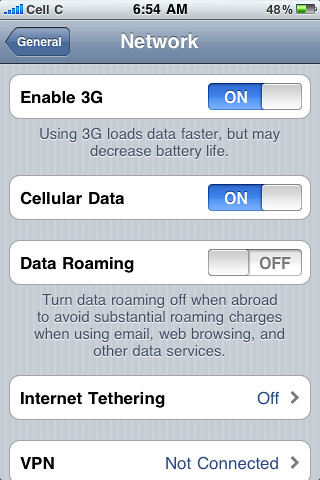
Roaming costs are usually things that you don’t want to have to deal with when you’re traveling. Does that mean that you’re better off just setting your roaming to off? Not necessarily, In reality, at least how we see it you may need to have a bit of a love hate relationship with your roaming options. When deciding whether to keep roaming on or off you should be taking into account what each decision is going to entail. Sure, turning it off could save you money when you’re traveling. The thing is you may render your phone completely useless in certain moments if you don’t accept the roaming fees. What is that you really want to do?
In this article we are going to be going over all of the pros and cons of each decision. Going with roaming on or off doesn’t have to be an irreversible decision. The issue is that if you do leave it on when you could benefit more from having it off that could result in an unpleasant surprise when you get back home. You have to be very careful with your data usage in general. Particularly when you’re traveling abroad. Is this an issue that you would have to be dealing with when you’re using your phone locally? Maybe, maybe not, that could depend on your service provider or the type of plan that you have. These are all things that we’re going to be exploring in this article.
- What does data roaming on mean?
- How much could you expect to pay for roaming?
- Data roaming on or off – Is this a decision that you have to make when you’re using your phone locally?
- Where you travel does matter
- Avoid roaming at all costs?
What does data roaming on mean?
The first thing that we have to cover to be able to answer whether data roaming on or off is a better idea is what keeping your data roaming on would mean. If you keep your data roaming on you’re going to be able to get coverage outside of your regular coverage area. That’s certainly a positive way to look at it. In the past you could actually incur in roaming fees even inside your home country. These days, roaming is essentially a fee that you’ll have to pay for any type of coverage that you receive outside of your home country. Keeping data roaming on allows you to be liable for coverage. That doesn’t necessarily mean that you’ll always have great coverage or service wherever you are. That’s also an important aspect to keep in mind for sure.
When you decide that you want to keep data roaming off you’re essentially keeping yourself from getting hit with roaming. Since no data or coverage is going to be transmitted to the phone. Obviously, the bad thing about this is that you’re not going to be able to call or send texts when data roaming is off. What you will be able to do is connect your cellphone to a wifi network or other type of network. For example, if you have a friend that does have coverage they can share their phone internet with you if you will. This will still mean that you won’t be able to make regular calls or texts. Through a wifi network though you’ll be able to use apps that are going to allow you to call or text through them.
How much could you expect to pay for roaming?

Roaming can be very expensive. Depending on the wireless service that you’re enrolled with. We are going to be looking at what we believe are the two ends of the spectrum with US wireless service companies to answer this question. The cheapest end of the spectrum if you will is what T-Mobile offers. Essentially they give people on unlimited plans, unlimited coverage abroad as well. The difference is that when you’re abroad you’ll get 2G speeds on your coverage. If you want to make calls abroad you’ll have to pay 25 cents per minute. Texting rates can go from 10 cents on pure texts to over 50 cents for images and audio files. As we mentioned this is essentially the lower end of the spectrum. We feel that T-Mobile is counting on people to get tired of 2G speeds, and ultimately pay more to get extra speed on their coverage.
The highest end of the spectrum is what AT&T offers. Just a reminder these rates can change at any given time. We’ll want to make sure to update this article if that happens. That being said, at the time of writing AT&T has the highest rates that you can find out there. It’s 2.05 dollars per MB that you use of data abroad. Per minute rates can go as high as 3 dollars a minute. You are not going to get any type of unlimited coverage or anything like that. Essentially with AT&T you can be sure that you’ll have to pay an extra fee for all of the coverage that you get abroad. As we alluded to, the rates can change depending on the country that you travel to.
Data roaming on or off – Is this a decision that you have to make when you’re using your phone locally?

We’ve mentioned this already in this article, but we wanted to make sure that we gave a straight answer. That by the way, could be much better researched. From what we can find, virtually all of the countries in the world that have cell coverage are going to allow local users to use their phone regularly throughout the whole country. Does that mean that you’re going to have the same type of coverage no matter where you go? No, that’s not going to be the case! US phone users will probably be very familiar with the coverage maps that the most popular wireless service providers promote. In those areas that you don’t have coverage that doesn’t mean that you’re going to be charged with roaming fees. It just means that you literally won’t have cell service.
Would you need to turn your data roaming on or off when you visit an area where you don’t have coverage? The answer is clearly no. You won’t have coverage in that area or at best service is going to be shaky. That doesn’t mean though that you’re going to be hit with roaming fees or anything like that. By the way, even if you have roaming active in these areas whether it be locally or abroad there’s no guarantee that you’ll get coverage. The problem that you could have when you’re abroad is that if roaming is on even if the service is shaky you can still get hit with hefty fees!
Where you travel does matter
This may be a pretty obvious thing to say, but where you travel does make a huge difference. For example, most US service providers now offer certain lower cost data plans in Mexico and Canada. In some of these cases you’re going to be able to use your phone almost the same as you would locally. Except for a couple of extra fees with calls. When it comes to data though, and more specifically data roaming you’ll be able to keep roaming on and be ok. Just make sure that you know the limits of your coverage in those countries. As a general rule most US service providers won’t provide coverage for their users when they are abroad for more than 30 days. Even if you pay roaming fees on day 31 of being abroad your phone is going to stop working. That’s something that you’ll want to look into.
It can be said that Mexico and Canada are on the bright side of this issue. With most of the European destinations getting the same price. (This of course as it pertains to American wireless service companies). If you travel to more exotic places, or China and Russia you may have limited coverage at best, no coverage in certain places. Even with data roaming on and being willing to pay hefty roaming fees. Calls to and from different places while on roaming can have a different per minute rate. Particularly if you’re strictly with data roaming on and no international day pass active. We know this can all sound overwhelming. As we’ve talked about in many articles throughout the site, you’re going to be well off if you plan how you want to get coverage abroad way before you travel. So that you know the consequences.
Avoid roaming at all costs?

Should you be avoiding roaming at all costs? The short answer is probably yes. It does depend though on the roaming rates that your service provider offers. We’ve talked about this already, T-Mobile seems to be the service provider that offers the lowest roaming rates. Even giving people with unlimited plans unlimited data abroad. When you look closely though, that ability to have unlimited data at 2G speeds seems like the perfect strategy to get the user on the hook, and have them not plan how to get coverage ahead of time. Ultimately, what ends up happening is that you’ll find yourself buying international day passes to get more speed. Granted, with T-Mobile you can flirt with roaming a little bit more.
AT&T and Verizon have a different approach. They have very similar roaming costs. Both of them brand them as pay as you go plans. They just do this to not call it roaming because they know that people run away from roaming real quick. At the time of writing for this article the roaming rates for both of these companies were through the roof. You can be on the hook for a ton of money when you take into account that you’re getting charged 2 dollars per MB of data usage! That can add up quickly and your bill at the end of the month is going to be insane.
Even though you can flirt a little bit more with T-Mobile’s rates there’s still a chance of getting burned big time. So we would have to say that avoiding roaming fees is one of the best things that you can do. Especially when you have other options like getting a local SIM card that can potentially offer better coverage at lower rates. Yes, there are a set of things that come with that. If your bottom line is money though it’s hard to argue for keeping your data roaming on.
Roaming On or Off – Conclusion
As is the case with many of these articles there’s really not one right answer. When it comes to roaming you need to have a clear idea of what you could be charged for. Certainly one of the major issues with roaming is that people feel like they’re hit with fees that don’t even make sense. Therefore, before you ever put the roaming button to on it would be a good idea to know exactly what could happen when you do that. It’s true that some wireless service providers have better roaming policies than others. At least better for the user. While some still employ the same old tricks that companies have used for years to essentially get the most money that they can out of traveling clients.
Ultimately if we had to pick a solution to the data roaming on or off dilemma, we would certainly say that off is the safe option. Roaming is the last resort if you will. Typically, when you travel abroad you’re going to want to have a plan in place for how you’re going to get coverage. From our perspective roaming is literally what you end up doing when you don’t have a plan in place and you’re just desperate to get a call out or whatever it may be. That’s fair if you find yourself in that position by all means go for it. Sticking to roaming as a regular way to get coverage abroad can be massively expensive.